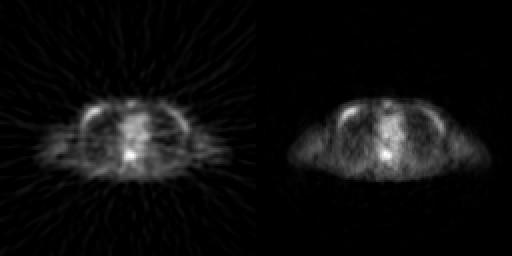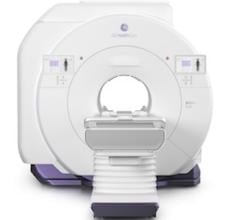
FDG-PET breast cancer patient.
December 17, 2009 - Positron emission tomography (PET) scans used with an agent called 64Cu-TP3805 may significantly contribute to the management of breast cancer, reducing the number of biopsies.
Scientists from the Kimmel Cancer Center at Jefferson have discovered a possible way for malignant breast tumors to be identified, without the need for a biopsy, according to findings published online in the Journal of Nuclear Medicine.
Because current imaging modalities miss up to 30 percent of breast cancers and cannot distinguish malignant tumors from benign tumors, which leads to biopsies, approximately 5.6 million biopsies performed in the United States find only benign lesions.
To better identify malignant tumors, Mathew Thakur, Ph.D., professor of Radiology at Jefferson Medical College of Thomas Jefferson University and director of Radiopharmaceutical Research and Nuclear Medicine Research conducted a study using an imaging agent to target a specific biomarker that visualizes malignant breast lesions early and reliably.
An agent called 64Cu-TP3805, which is used to evaluate tumors via PET imaging. 64Cu-TP3805 detects breast cancer by finding a biomarker called VPAC1, which is overexpressed as the tumor develops.
The researchers compared the images using that agent with images using the "gold standard" imaging agent, 18F-FDG. They used MMTVneu mice, which are mice that develop breast tumors spontaneously, like humans. The mice first received a PET scan using the 18F-FDG. Then they received a CT scan, and then they received another PET scan using 64Cu-TP3805.
Ten tumors were detected on the mice. Four tumors were detected using both 18F-FDG and 64Cu-TP3805, and four additional tumors were found with 64Cu-TP3805 only. All eight of these tumors overexpressed the VPAC1 oncogene on tumor cells and were malignant by histology. The remaining two tumors were benign and were detected only with 18F-FDG. They did not express the VPAC1 oncogene, and thus were not detected by the 64Cu-TP3805.
According to Dr. Thakur, if 64Cu-TP3805 is equally as effective in humans, then he believes PET scans with 64Cu-TP3805 will significantly contribute to the management of breast cancer.
For more information: www.snm.org


 February 24, 2026
February 24, 2026 









